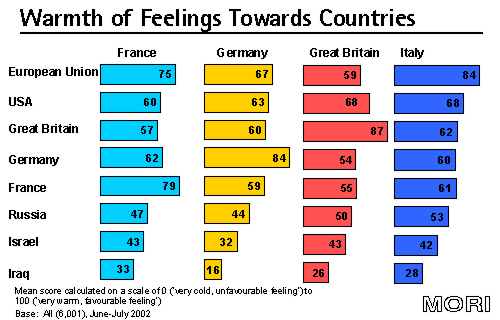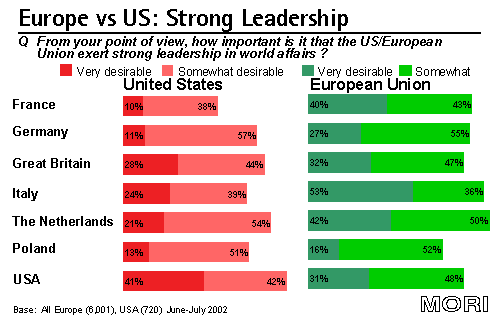America's PR Problem
The United States of America has a PR problem. It's not just that they are overpaid, over weight, and over here, although they are, it's that they are misunderstood. That's a big problem for the US of A, for the President, George W. Bush, and it is certainly a problem for Britain's Prime Minister, Tony Blair, at this time of world tension.
Most people in Europe think America is full of warmongers, yet the majority of Americans as well as Europeans are in favour of war in Iraq but only with the approval of the United Nations under a new UN resolution. Pew Research found in January that by four to one Americans favour military action in Iraq if the inspectors find that smoking gun, and report to the Security Council that they saw it in Saddam's hand. But if the inspectors can only report that they think it's there but haven't seen it, Americans are as torn about going to war as are the Europeans, with 46% supporting the use of troops, but 47% opposed. If they report there's no smoking gun, Americans are two to one against the war.
Seven in ten Brits reject Britain troops joining in a land war in Iraq alongside American forces without the second UN vote. However, opposition to Britain's involvement in the war falls to just 22% if the second UN resolution is passed.
Last month I delivered the Einstein Forum Lecture in Potsdam, Germany. I chose as my title 'What Europeans Really Think about America'. My principal source was the results of a survey we carried out last year for the Chicago Council of Foreign Relations and the German Marshall Fund. The survey was carried out in the USA by Harris Interactive and by London-based MORI in six European countries, including Britain, France, Germany, Netherlands, Italy and Poland. The survey found:
- Europeans, especially the British, feel warm towards America, yet neutral towards most European countries (see graph),
- Nine in ten Europeans (including the British) say the United States has a great deal of influence in the world, yet:
- Two out of three Europeans (the French excepted) believe it is desirable that the US exert strong leadership in world affairs: the Dutch 74% said 'desirable', the British 68%, the Poles 65%, the Germans 61%, the Italians 57%, but the French only 39%, but:
- A majority of Europeans say they would like the European Union to become a superpower like the US; this is especially strongly supported among younger people, and more would think it desirable that the EU exert strong leadership in world affairs than do people in the USA, a majority saying that they would prefer the US to be the only world super power.
- Europe is split on rating the Bush administration's handling of its overall foreign policy: the British, French, Germans and Dutch are on balance critical, the Italians and Poles favourable,
- The European public is split on rating the Bush administration's handling of international terrorism, with again France being the most negative. In the other five countries, those saying 'excellent' or 'good' are about half, while the other half saying 'fair' or 'poor', but
- There is uniform condemnation of the Bush administration's handling of the Arab/Israeli conflict, with as many as two thirds in every country except Poland rating it as fair or poor, and a majority of Poles, 57%, also critical.
- There is even greater condemnation of the US's handling of the problem of global warming. Most people in most of these countries say they regard global warming as 'an extremely important threat' to their country, at least twice as many rating global warming as an extremely important threat as say globalisation is in each country.
- There is overwhelming support across Europe, and especially in Britain, for strengthening the United Nations, and two-thirds of Europeans, including the British, for strengthening NATO, with four times as many people in Britain saying NATO is essential to British security as say it is not, more than three to one in Germany and the Netherlands, more than two to one in Italy and Poland, and even nearly two to one in France.
Such strong support for NATO and the UN surprises most people over here, and must astonish Americans. The German Chancellor and the French President seem bent on weakening NATO, in opposition to the clear preference of their own citizen's opinions. By two to one in both countries the German and French people are in favour of strengthening NATO, and two thirds of the French and three in four Germans are in favour of strengthening the UN.


Over the past thirty years I've tried to keep an eye on anti-Americanism, both as an American citizen enjoying British hospitality for so many years, and more recently as Chairman of the Pilgrims Society for the past ten years, the Anglo-American organisation dedicated to the furtherance of Anglo-American good fellowship.
Nothing surpassed the way the British generally and certainly the British establishment reacted to the events of September 11th, the playing of the Star Spangled Banner at the Palace, the Prime Minister's 'Shoulder to Shoulder' speech, the congregation at St Paul's Cathedral for the Memorial Service, and the outpouring of affection and condolence from the British people.
So why then was I surprised, as have been every audience I've shared the finding with that the percentage of those who say 'I like Americans as people' has risen, not fallen, over the past decade, from the time of the famous Reagan-Thatcher 'love-in' in 1989 to now? It must be because of all the anti-American newspaper articles and statements by self-appointed spokesmen and women who sound off in the media about British public opinion.
And the British like Americans as people, and although they have some reservations about the current (and past) American Presidents' capacity for world leadership (as do many Americans), think there's a lot the British can learn from the Americans, most have confidence in American foreign policy if think sometimes it's inept, and most people in Britain are prepared to back America in the Wars both against terrorism and in Iraq.
This article was first published in the Chicago Tribune
Sir Robert Worcester is Chairman of MORI



